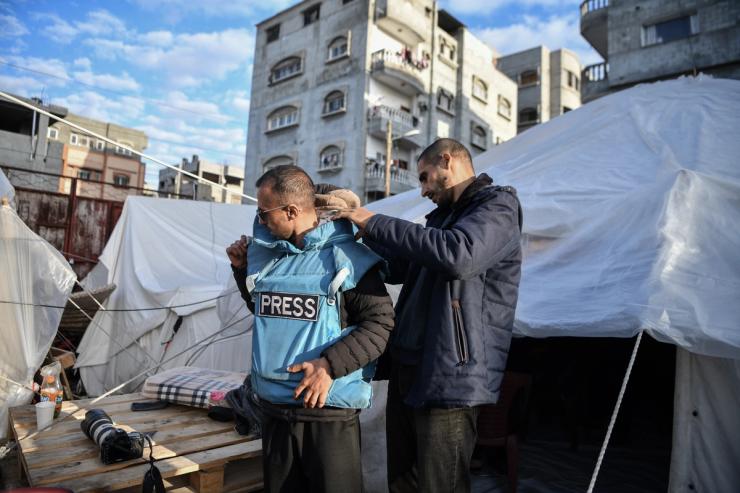The Scoop
Pro-Israel groups, deeply critical of American news outlets such as the Washington Post over their coverage of the war in Gaza, have been working in public and behind-the-scenes to discredit specific journalists seen as biased against Israel.
SKDK, the Washington, D.C. public relations firm with close ties to President Joe Biden’s White House, has been running communications for the 10/7 Project, a consortium of five Jewish organizations founded last year to promote “continued US support for Israel and counter misinformation about the Israel/Hamas war.” Over the past several months, that work has largely consisted of sharing daily memos to journalists pointing out what the group sees as flaws in coverage, such as what it sees as under-coverage of Hamas’ sexual assaults of Israeli hostages taken on 10/7 and failures to acknowledge the US government’s assessment that Hamas had a military presence at the Al-Shifa hospital.
But it also has been keeping tabs on reporters that it felt were reporting and tweeting unfairly about Israel, and putting pressure on major national news organizations to punish or remove these reporters from the beat. In particular, the group has singled out the Washington Post and its foreign correspondent Louisa Loveluck, who has covered the war in Gaza with an emphasis on Palestinian civilians impacted by the violence.
In one five-page document shared with Semafor, the group included a list of grievances about Loveluck’s coverage of Gaza and tweets about the conflict. It included recent corrections and editor’s notes on her stories that it said demonstrated her “erroneous or biased reporting,” including one story an editor’s note conceded “mischaracterized some aspects of Israeli rules for permits that allowed some Palestinian women,” and a story that suggested “Doctors Without Borders accused Israeli forces of deliberately firing on a convoy carrying employees of the organization,” when the group had condemned the attack but not named a perpetrator. Loveluck also won the group’s ire by failing at times to note that Gaza’s health ministry is controlled by Hamas.
But the group went further into Loveluck’s past before her time as a journalist. The document also contained a deep dive of her tweets, going all the way back to 2009 when she was a student in college.
“For many years, Loveluck’s online presence was that of a far-left activist: she has voiced negative opinions about pro-Israel American leaders and Israeli leadership, has been a proponent of the anti-Israel Qatar-owned Al-Jazeera TV, and took part in the Cambridge University occupation in 2010, which protested against proposed tuition fee rises, where she attended university,” the group wrote in a memo.
The tweets included tweets from 2011 saying former President George W. Bush’s memoir made her “angry,” and former President Barack Obama’s silence in Egypt’s post-Arab Spring elections was “deplorable,” and posts noting that she watched Al Jazeera with her mother.
In another document shared with Semafor by the 10/7 Project, the group listed seven pages of each of Loveluck’s tweets and retweets since 10/7, categorizing them by whether they were considered critical of Israel, “supportive of the hostages,” or mentioned Hamas. The group noted that Loveluck had tweeted hundreds of times criticizing Israel, but just a handful that mentioned Hamas or was sympathetic to the hostages.
In a statement to Semafor, SKDK’s Jill Zuckman said that while it was “undeniably hard for serious journalists to cover the complexities of the Israel-Hamas war,” Loveluck “repeatedly displayed bias toward the subjects of her reporting in her tweets and retweets,” justifying an examination of her coverage and personal life.
“Clearly, Loveluck’s poorly reported articles did not meet The Washington Post’s standards for fairness, as its own editor’s note stated. The 10/7 Project is making it our responsibility to shine a spotlight on unfair coverage and to demand unbiased, honest reporting from our country’s leading media outlets.”
In a carefully worded statement, the Washington Post notably stood by its reporting, but did not defend Loveluck’s tweets. The Post said it had consistently published explanatory reporting on where it gets data about the Israel-Gaza War, including “examinations of the Gaza Health Ministry as a source and explanations that it is an agency of Gaza’s elected government, which is run by Hamas,” and noted that it also cited Israeli government figures. The Post also pointed out that it was one of the only among major news organizations that withheld the claim that Israel was at fault in the immediate aftermath of the blast at the Al-Shifa hospital.
“The Washington Post produces rigorous, in-depth journalism, and we expect and welcome scrutiny of our reporting,” a spokesperson said. “When we make errors, we take every step to correct them and to provide full transparency to our readers. The Post expects our journalists to refrain from social media postings that could raise questions about our fairness or independence. We also prioritize the security of our employees, and we cannot condone any efforts that could endanger or jeopardize their safety.”
Loveluck did not return a request for comment.
In this article:
Max’s view
It is not abnormal for interest groups to have frustrations with individual reporters, and supporters of Israel have for decades accused Western correspondents of sympathizing with Palestinians over Israel’s security demands. But the frontal confrontation between SKDK and the Washington Post over Loveluck’s work illustrates the intense pressure on journalists covering the conflict, and the scrutiny that stretches past a decade to benign college-aged tweets.
The extensive research on a single reporter at the Post was emblematic of the pressure major news organizations are under from well-organized groups to keep their focus on Hamas. These groups have found some success. As Semafor previously reported, following criticism of its coverage by ADL President Jonathan Greenblatt, for several days last year MSNBC sidelined some of the hosts who had been skeptical of Israel’s forceful response to the Hamas attack. Left-leaning news outlets like the Nation have complained that the New York Times, PBS, and other outlets have “uncritically promoted” claims from groups like the ADL. News organizations, meanwhile, also face intense internal pressure from younger staffers and correspondents in the region to tilt more toward Palestinian perspectives. The Washington Post’s own cautious statement, which did not defend Loveluck’s tweets, also demonstrated the great caution many national news organizations are taking toward the conflict.
But Israel’s advocates are increasingly finding that the Democratic Party in general, and the Biden White House in particular, are also shifting away from the Netanyahu government’s point of view.. SKDK has close ties to the Biden White House, and often mirrors its priorities. But Biden and his aides are losing patience with the Israeli government’s approach to the war and tolerance for high Palestinian civilian casualties, which could create a rift between him and a key outside support groups.
Notable
- The former AP correspondent Matti Friedman argued in 2014, during another Gaza conflict, that a “hostile obsession with Jews” is at the root of what he sees as media bias against Israel. The piece remains a touchstone of pro-Israel media criticism. His conclusion: “Israel is not an idea, a symbol of good or evil, or a litmus test for liberal opinion at dinner parties. It is a small country in a scary part of the world that is getting scarier. It should be reported as critically as any other place, and understood in context and in proportion... Israel is a speck on the map—a sideshow that happens to carry an unusual emotional charge.”
- There is, of course, also a widespread belief that the U.S. media is biased toward Israel. The Intercept last month published an analysis of U.S. media last month found that reports “emphasized Israeli deaths in the conflict; used emotive language to describe the killings of Israelis, but not Palestinians; and offered lopsided coverage of antisemitic acts in the U.S., while largely ignoring anti-Muslim racism in the wake of October 7.


